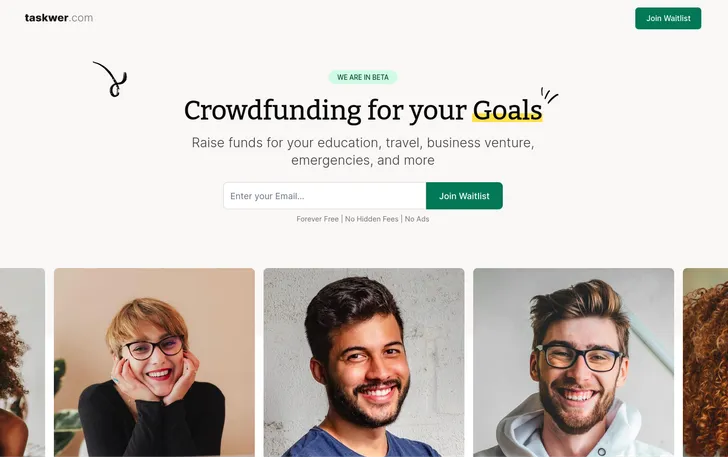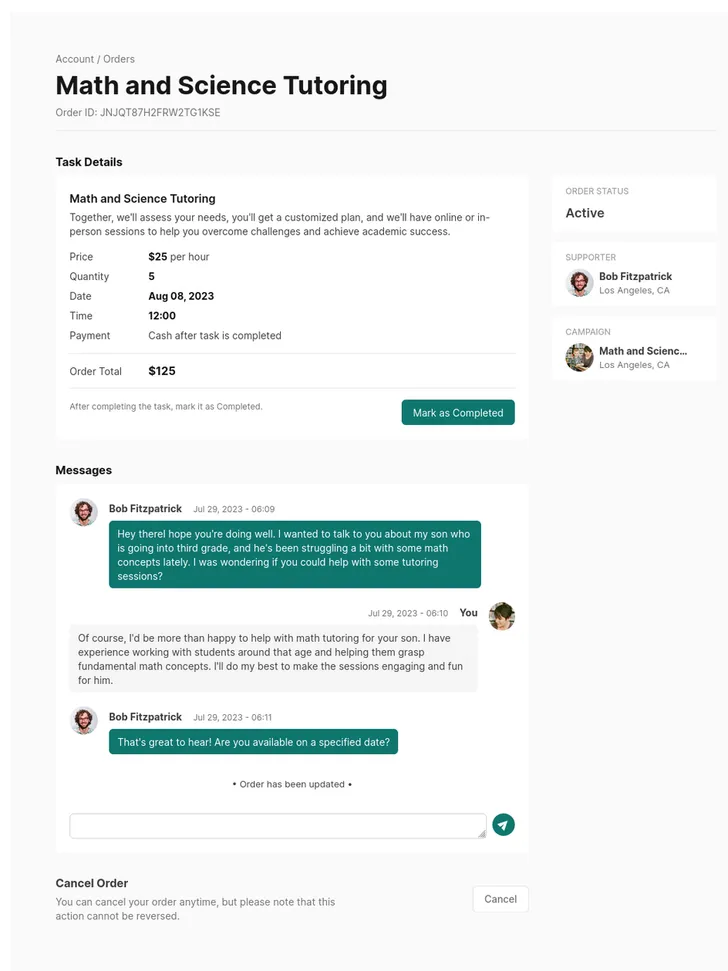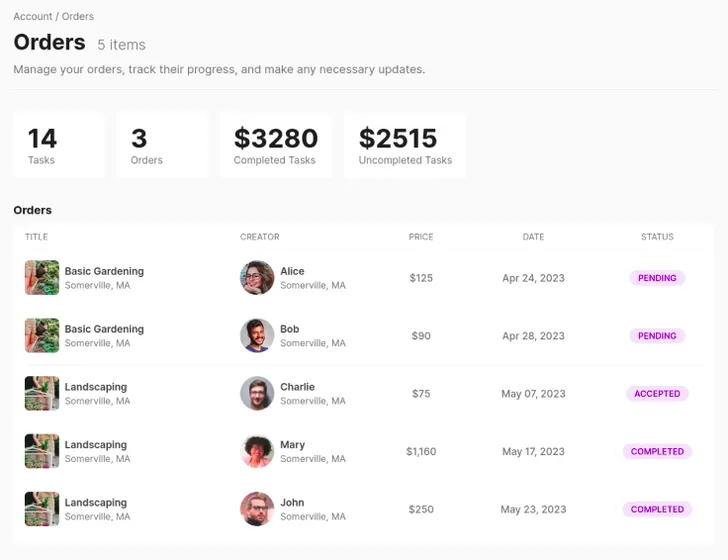- project
How I spent a year building an App and failed - The Story of Taskwer
by Chris

I’ve been a web developer for many years now and building things is something I truly enjoy. My mind is always full of ideas and over the years, I’ve built some of them. They were mostly small, personal projects, nothing of real significance, but this project was different.
The Problem
It all started some two years ago, just after the COVID pandemic when the inflation started. Prices began to soar leaving many people struggling to make ends meet. Even those with full-time jobs found it increasingly difficult to pay their rent, utilities, even groceries. And this wasn’t happening to someone else, this was affecting our families, friends, everyone around us. Most people just needed some extra cash to make it through the month but if some kind of emergency happened, like an unexpected medical bill or a funeral expense, they had no way of covering the cost.
To earn some extra income, many turned to platforms like TaskRabbit, Fiverr, and even GoFundMe. However, the problem with those platforms is that well-established service providers with many reviews, dominate the market. It’s very hard to get traction as a new user and it can take weeks or even months to get any work. And this becomes a big problem for those who need funds imediately. As I was thinking about it, I got an idea to build a new kind of platform - one where people can offer services like tutoring, babysitting, home repair, creative services etc to people in their communities and raise funds that way.
It would be a fusion between TaskRabbit and GoFundMe where people would create their campaigns, share their stories, set their funding goal, similar to GoFundMe. However, instead of asking for donations, they would offer services based on their skills and talents. They would share their campaigns with family and friends and they would share it with their friends and the word would spread organically. This approach would also foster trust, as people would be dealing with people they already know or have mutual connections with instead of relying on reviews from strangers.
It would be a place where people could come in the times of need, a place where they can offer their valuable services, and get paid right after completing their orders without friction. Their supporters would get the service they need but also know that they helped someone when it mattered the most. It would be a place where communities get together and people help each other.
Taskwer
I called it Taskwer and so I started working on it. First, I created a campaign builder which allowed creators to create their stories, set goals up to $20,000, add images and video to showcase their skills, list multiple services and set different pricing options for them. One feature that was very important from the first moment was the support for cash payments so people could be paid right after completing the order. And there are no fees on those transactions.



I developed an ordering system which allowed campaign supporters to place orders. They could use the messaging system to talk with campaign creators and discuss their needs in detail confirming the order. Creators could accept or decline orders, create custom offers and more. I also created multiple dashboards for both creators and supporters to track their campaigns and orders. I also built a support system if anything goes wrong.
After a few months of development, I felt it was time to talk to people so I shared it with some friends and people I know. The feedback has been mostly positive, they understood the problem I was trying to solve and they liked the whole idea. However, a couple of friends shared the concern that some people might feel hesitant and ashamed to share their financial struggles with others.
I got their point and I agreed with them - Taskwer is not for everyone but I couldn’t ignore the fact that so many people are comfortable with asking for donations on other platforms without offering anything in return. I genuinely believed that people would find this platform useful because Taskwer isn’t just about asking for help; it’s about taking the power into your own hands and creating opportunities for yourself.
I got back into development and spent the next couple of weeks refining and fixing things, adding new features etc. There were still so many things I wanted to add, but at this point, Taskwer was a fully-functional MVP so I decided to launch it. Hundreds of people visited Taskwer from HN and Reddit. Some people liked it, some people failed to understand how is it different from other platforms out there as I didn’t explain it properly but overall, I got some really good feedback. The problem was that none of these people were my users. They weren’t facing financial issues so Taskwer wasn’t useful to them. I also reached out to various organizations, food banks, and even people running campaigns on other platforms. And that’s when a real problem emerged; nobody knew who I was.
I’m an introvert with a small circle of friends, and I’ve been working remotely for the last couple of years. I don’t use Facebook, Instagram, Twitter, LinkedIn or any other social network so I don’t have a network of people that could help me out. And to the people I reached out to, I was just another faceless guy trying to sell them something. It was heartbreaking. I felt invisible, like I was all alone in this world. I could have had the best thing in the world, and no one would care.
At that moment, I started to doubt the whole project. Is my idea fundamentally flawed? Did I waste months on the wrong thing? I don’t know. As I had failed to reach people who could benefit from the platform, I couldn’t be sure about anything. I also started this project without any funding and without a marketing budget I couldn’t experiment with different strategies to find out what could work.
Some people suggested I should try making the app more positive and to turn it into a platform where people could raise funds for their goals such as education, travel, business ventures which would remove the negativity associated with financial struggles. I made the necessary changes to the landing page and the app, but once again, I didn’t have an audience so I gave up.
This is really hard, I’ve made so many mistakes and I attribute that to my lack of experience on the business side. I genuinely believed in this idea, I believed it could really help people and that belief kept me going for so long. And perhaps it’s not a bad idea, but I just don’t know, and without the resources, I will never find out. Unfortunately, I can’t afford to spend another couple of months trying to figure out how to make it work, so I’ve decided to shut Taskwer down for now.
Lessons Learned
Ideas are seductive
Ideas often come in a form of a vision - a vision of the world we want to see, with people happily using our apps and products. That vision gives us so much energy that we want to work on it all the time and enjoying every second of it, no matter how hard the work may be. However, that vision lives only in our minds, and that doesn’t necessarily mean others will share it with us. That’s why we have to validate our ideas as early as possible by talking to people, gathering feedback, and ensuring our vision aligns with their needs. And then it becomes our mission to bring those ideas to reality.
Launching is not that hard
Launching products can be very intimidating and we’ll do anything to avoid it. We often postpone launching convincing ourselves that our products are not good enough, that we need to add just one more feature before it’s ready. But that’s only our mind playing tricks on us. In most cases, all we really need is to build a Minimum Viable Product - just enough to validate the core idea. Once we acquire first users and get some feedback, we can refine things and slowly turn it into a fully-featured product. And launching? It’s not that hard. Yes, our hearts may pound a little bit faster, and we may sweat a little bit more, but at the same time, it’s incredibly exciting and invigorating.
People are important
I learned this the hard way. As an introvert, talking to people doesn’t come easy, especially with those we don’t know. But if we choose this path, we have to do it regardless of how we feel and how hard it might be. And one thing is certain; talking to people is never as difficult as the feeling of loneliness when you want to say something and there is no one to listen.
What’s next?
First, I want to connect with people. That’s why I’ve created this blog where I’ll post about my projects, maybe I’ll even write some coding tutorials. I’ve also set up an Twitter account and a LinkedIn account, so you can follow me there. I’m starting fresh with 0 followers.
Also, I’m open to new opportunities, whether they are a freelancing projects, part-time collaborations, or full-time roles. I specialize in Elixir and the Phoenix Framework and can build CRUD apps, APIs, and more. Additionally, I can build small business and personal websites, landing pages, and other similar websites using Astro or 11ty static generator. These websites can be integrated with the headless CMS of your choice (Sanity, Prismic, Decap, Payload, etc.). They are extremely fast, fully responsive, SEO-ready, and provide an excellent alternative to WordPress. Here’s a template I created for a friend a while ago Martha’s Design. So, if you need a something similar, feel free to reach out and I’ll be happy to help.